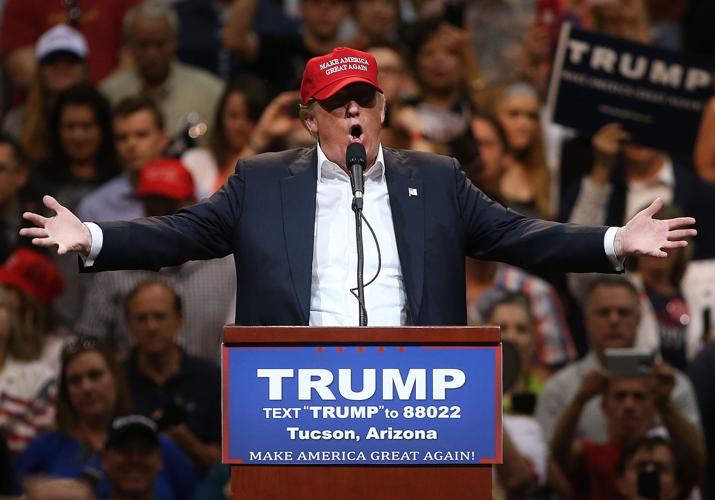We didn’t cover the presidential election much at the Arizona Daily Star.
We sent reporters when the candidates showed up, we profiled some voters, we reported some polls and endorsements, but overall we used our resources to cover state and local races and used wire services for the presidential race. Our editorial page didn’t even endorse a presidential candidate.
So why does it feel like we lost when Donald Trump won?
The obvious answer is that we’re all a bunch of liberal Democrats who wanted Clinton to win. There’s likely some truth to that — I suspect that if we counted just the votes from the Star newsroom, Clinton would have won in a landslide.
But what’s going on is much more multifaceted than the longtime claims of “liberal bias” in the national news media and at your old “Red Star.”
I’ve been reading analyses, talking to outsiders and colleagues, engaging on Facebook and otherwise trying to figure out what the issues are for American journalism now and where we at the Star go from here.
The problem isn’t just that news organizations lined up against Trump in their endorsements and some of their coverage. It’s that Trump and the dynamics surrounding his win represent a rain of blows against traditional American journalism.
For those of us who work in the so-called “legacy me dia” — newspapers and longstanding TV and radio networks — these blows represent a threat to our livelihoods by turning a segment of the public against us. But to the country at large, the changes threaten our democratic way of governing.
The most obvious problem is the proliferation of “fake news.” These are stories people share on social media that are not just biased or erroneous in some way, but completely made up. This year, most of them were against Clinton. One of the most widely read fake stories claims that emails exposed by WikiLeaks showed Clinton sold weapons to ISIS.
But I’m starting to grasp that “fake news” is a symptom, not the original problem. Part of the reason for the problem is that politicians like to frame reality in the way most beneficial to them — and Trump takes this tendency to extremes. He creates an alternate reality with his statements and tweets, one that his followers are eager to believe.
One of the most glaring examples was this Nov. 27 tweet from Trump: “In addition to winning the Electoral College in a landslide, I won the popular vote if you deduct the millions of people who voted illegally.”
Many experts pointed out there was no evidence of millions of people voting illegally. It hardly matters. When Trump says something, his dedicated followers accept it — and debunking by journalists only serves to discredit their news organizations further in the supporters’ eyes.
Just as important as Trump’s efforts at creating alternate realities is everybody’s natural tendency toward confirmation bias. Almost all of us find it easier to believe news that we agree with than news that challenges our preconceptions. Thanks to the proliferation of news — or news-like — websites, no one needs to confront facts that could change their minds.
Of course, journalists aren’t immune to confirmation bias — and that’s another source of our problems. While we traditional journalists may strive to be factual, we aren’t necessarily representative. I found out by driving 125 miles around the Tucson area on Election Day that people from a surprising variety of backgrounds were supporting Trump.
Sure, Clinton won Pima County, but we could have had a sense of what was coming on Election Day — and represented the facts on the ground in Southern Arizona better — if we had dedicated ourselves more to covering the campaigns and done a better job at listening to voters before the election.
That isn’t to say we’re necessarily bad at this at the Star — we probably deserve a “needs improvement” grade. I tried to gauge if I was viewing our own performance accurately by asking Todd Rathner, a National Rifle Association board member who lives in Tucson, to take a look at the paper.
Rathner and I sparred in Facebook discussions after I heard him refer to the “leftist vipers” in the media. That, to me, went too far, so I engaged. He certainly didn’t change his mind about the big outlets, but when he read a few issues of the Star — something he hadn’t done in years — he gave us a passing grade.
“I would say it’s a pretty decent local paper,” he concluded via Facebook.
Later, Rathner and I met for breakfast, and he said, “I haven’t seen anything that is blatantly biased in the way I think CNN and the New York Times are biased. It feels like there’s an attempt to be neutral.”
I appreciated that, of course, and find that perhaps our best road forward is through keeping up our efforts at fact-based reporting that can be trusted while adding increasing representation of the community we cover and stepping up the bravery in our reporting. These days, just being factual is a distinguishing feature in and of itself.
Still, squaring neutrality with bravery will be where we run into the toughest problems in the era of Trump.
Trump’s constant rousing of mobs against the press during the campaign, and his efforts to create a chaos of alternate realities through his words, put us in a place where we can’t always be neutral and must be brave. They are also signs of an aspiring authoritarian.
A Tucsonan now living in Taiwan, Daniel Brockert, pointed out to me that the effort to create a confusing chaos of information helps authoritarians increase control, as author Hannah Arendt pointed out in her 1951 book, “The Origins of Totalitarianism.”
The totalitarian mass leaders based their propaganda on the correct psychological assumption that, under such conditions, one could make people believe the most fantastic statements one day, and trust that if the next day they were given irrefutable proof of their falsehood, they would take refuge in cynicism; instead of deserting the leaders who had lied to them, they would protest that they had known all along that the statement was a lie and would admire the leaders for their superior tactical cleverness.
This has the ring of familiarity to me. In such an atmosphere, it will be important for journalists even in relatively remote burgs like Tucson to stay alert, reflect reality and be brave.





